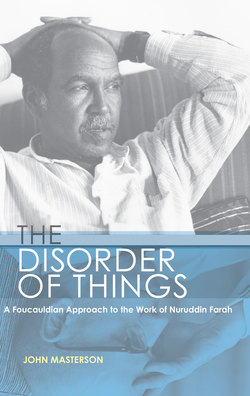Читать книгу The Disorder of Things - John Masterson - Страница 12
На сайте Литреса книга снята с продажи.
Foucault in/and Africa
ОглавлениеJames Miller includes witness accounts of Foucault adopting full revolutionary garb during a pitched battle with police at the Vincennes campus on 23 January 1969 and how ‘he exulted in the moment, gleefully lobbing stones – although he was careful not to dirty his beautiful black velour suit’ (Miller 2000: 179). Of greater interest, in terms of a book concerned with various locations, dislocations and relocations, however, is the way in which Foucault’s subversive sabbatical in Tunisia, between 1966 and the end of 1968, proved definitive in terms of his intellectual and transnational vocations. Beyond his cloistered study, the visceral explosion of revolutionary energy made flesh in student uprisings at the University of Tunis had a profound impact upon him. In light of the issues outlined above, this geo-political shift is highly significant. Before and beyond the events of Paris later that year, Foucault experienced a powerful jolt to his views concerning Marxism, direct action and effective strategies of resistance. As Alessandro Fontana and Mauro Bertani maintain in ‘Situating the Lectures’, ‘against this backdrop of war, of the wars, struggles and rebellions of those years when, as the saying went, “there was red in the air”, “Society Must be Defended” might be described as the meeting point, the hinge or the point of articulation of the political problem of power and the historical question of race’ (Foucault 2003: 286). The image of the celebrated enfant terrible of French letters temporarily trading lectern and lectures for roof top and rocks holds a peculiar attraction for those concerned with challenging certain caricatures of Foucault. As Robert Young has persuasively argued, that these actions took place on streets far from the European centres that dominate his writing and thought is of crucial importance (Young 2001: 395–410). Pre-empting his more problematic association with the Iranian Revolution, Foucault encountered the peculiar immediacy of his speculations regarding power and disciplinary mechanisms outside the metropolitan, colonial centre. This in turn suggests that the answer to Stoler’s question, as posed in Carnal Knowledge, is ‘yes’: ‘[w]as it significant that [Foucault] had spent 1966 through spring 1968 in Tunisia – a former French colony – where he wrote The Archaeology of Knowledge, wrote friends about anti-Semitism, and had his work repeatedly interrupted by student strikes against the governing policies of a newly empowered state?’ (Stoler 2002: 143).
Once again, the ‘Society’ lectures occupy an intriguing position here. Delivered some years after the embryonic revolts in Tunisia and Paris, and before events in Iran, they are distinguished by a peculiar rhetoric espousing the need to recuperate fragmented, contingent and subjugated knowledges. It therefore seems no coincidence that, throughout this period, Foucault attended to the dissolution of much that previously appeared stable: ‘I would say: for the last ten or fifteen years, the immense and proliferating criticizability of things, institutions, practices, and discourses; a sort of general feeling that the ground was crumbling beneath our feet, especially in places where it seemed most familiar, most solid, and closest to us, to our bodies, to our everyday gestures’ (Foucault 2003: 6). It is impossible to divorce this simultaneous attraction to doubt and fear of change from Foucault’s own experiences against a broader socio-historical and geo-political backdrop. With the anti-colonial insurrections in Indochina and Algeria never far from French political consciousness, and with the ‘distant roar of battle’ still echoing from Tunisian Kasbah to Parisian streets, Foucault’s lectures reflect a deeper need for pause, hesitation and reassessment (Foucault 2003: 273). It is the collision between a strategic grappling with doubt alongside a shift to consider more contemporaneously urgent forms of biopower that gives the ‘Society’ lectures their piquancy. They inform large swathes of The Disorder of Things.
